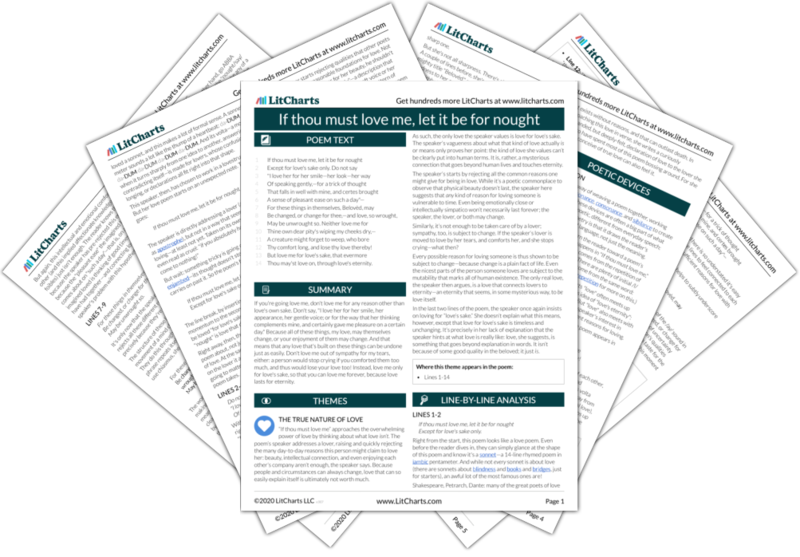
“If thou must love me,” one of the sonnets that Elizabeth Barrett Browning wrote for her beloved husband Robert Browning, proclaims what love is by examining what it isn’t. Real love, the poem argues, can’t really be explained. Any reason a person might give for loving someone else—beauty, intellectual connection, good times they've had together—is subject to change, because change is an inevitable part of life. The poem’s speaker thus wishes to be loved for not for any particular reason, but rather for love’s own sake. Only this kind of love, the speaker argues, can connect true lovers to eternity. The poem was published in Barrett Browning's Sonnets from the Portuguese in 1850, and follows the meter, rhyme scheme, and stanza form of a Petrarchan sonnet.
|
Get
LitCharts
|

|

The Full Text of “If thou must love me, let it be for nought (Sonnets from the Portuguese 14)”
1If thou must love me, let it be for nought
2Except for love's sake only. Do not say
3"I love her for her smile—her look—her way
4Of speaking gently,—for a trick of thought
5That falls in well with mine, and certes brought
6A sense of pleasant ease on such a day"—
7For these things in themselves, Belovèd, may
8Be changed, or change for thee,—and love, so wrought,
9May be unwrought so. Neither love me for
10Thine own dear pity's wiping my cheeks dry,—
11A creature might forget to weep, who bore
12Thy comfort long, and lose thy love thereby!
13But love me for love's sake, that evermore
14Thou may'st love on, through love's eternity.
The Full Text of “If thou must love me, let it be for nought (Sonnets from the Portuguese 14)”
1If thou must love me, let it be for nought
2Except for love's sake only. Do not say
3"I love her for her smile—her look—her way
4Of speaking gently,—for a trick of thought
5That falls in well with mine, and certes brought
6A sense of pleasant ease on such a day"—
7For these things in themselves, Belovèd, may
8Be changed, or change for thee,—and love, so wrought,
9May be unwrought so. Neither love me for
10Thine own dear pity's wiping my cheeks dry,—
11A creature might forget to weep, who bore
12Thy comfort long, and lose thy love thereby!
13But love me for love's sake, that evermore
14Thou may'st love on, through love's eternity.
-
“If thou must love me, let it be for nought (Sonnets from the Portuguese 14)” Summary
-
-
“If thou must love me, let it be for nought (Sonnets from the Portuguese 14)” Themes
-

The True Nature of Love
- See where this theme is active in the poem.
-
-
Line-by-Line Explanation & Analysis of “If thou must love me, let it be for nought (Sonnets from the Portuguese 14)”
-
Lines 1-2
If thou must love me, let it be for nought
Except for love's sake only. -
Lines 2-4
Do not say
"I love her for her smile—her look—her way
Of speaking gently, -
Lines 4-6
—for a trick of thought
That falls in well with mine, and certes brought
A sense of pleasant ease on such a day"— -
Lines 7-9
For these things in themselves, Belovèd, may
Be changed, or change for thee,—and love, so wrought,
May be unwrought so. -
Lines 9-12
Neither love me for
Thine own dear pity's wiping my cheeks dry,—
A creature might forget to weep, who bore
Thy comfort long, and lose thy love thereby! -
Lines 13-14
But love me for love's sake, that evermore
Thou may'st love on, through love's eternity.
-
-
“If thou must love me, let it be for nought (Sonnets from the Portuguese 14)” Poetic Devices & Figurative Language
-
Alliteration
- See where this poetic device appears in the poem.
-
Apostrophe
- See where this poetic device appears in the poem.
-
Assonance
- See where this poetic device appears in the poem.
-
Consonance
- See where this poetic device appears in the poem.
-
Caesura
- See where this poetic device appears in the poem.
-
Repetition
- See where this poetic device appears in the poem.
-
End-Stopped Line
- See where this poetic device appears in the poem.
-
Enjambment
- See where this poetic device appears in the poem.
-
Asyndeton
- See where this poetic device appears in the poem.
-
Personification
- See where this poetic device appears in the poem.
-
-
“If thou must love me, let it be for nought (Sonnets from the Portuguese 14)” Vocabulary
Select any word below to get its definition in the context of the poem. The words are listed in the order in which they appear in the poem.
- Thou, thee, thine, thy
- Nought
- Trick of thought
- Certes
- Wrought
- Bore
- Thereby
- Evermore
- May'st
-
- See where this vocabulary word appears in the poem.
-
Form, Meter, & Rhyme Scheme of “If thou must love me, let it be for nought (Sonnets from the Portuguese 14)”
-
Form
-
Meter
-
Rhyme Scheme
-
-
“If thou must love me, let it be for nought (Sonnets from the Portuguese 14)” Speaker
-
-
“If thou must love me, let it be for nought (Sonnets from the Portuguese 14)” Setting
-
-
Literary and Historical Context of “If thou must love me, let it be for nought (Sonnets from the Portuguese 14)”
-
-
More “If thou must love me, let it be for nought (Sonnets from the Portuguese 14)” Resources
-
External Resources
-
Life, Work, and Letters — Watch a short talk on Elizabeth Barrett Browning's life and work—as well as on the extraordinarily romantic correspondence between the poet and her eventual husband.
-
Browning's Biography — A short biography and links to more of Elizabeth Barrett Browning's poems.
-
Browning's Artistic Philosophy — Learn more about how the poet approached her art in this essay from Brain Pickings.
-
Sonnets from the Portuguese — The British Library's overview of the sequence of which this poem is part.
-
The Poem Out Loud — Listen to a reading of the poem (with dramatic accompanying music).
-
The Poem Illustrated — See an illuminated version of the poem from an 1897 manuscript.
-
-
LitCharts on Other Poems by Elizabeth Barrett Browning
-














